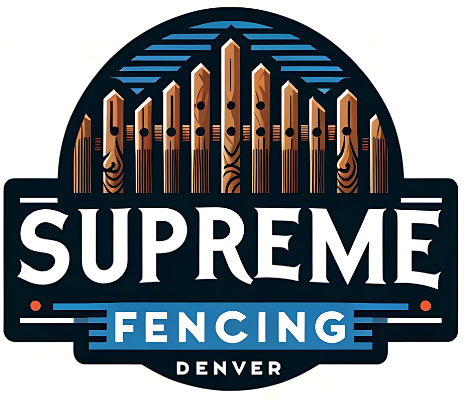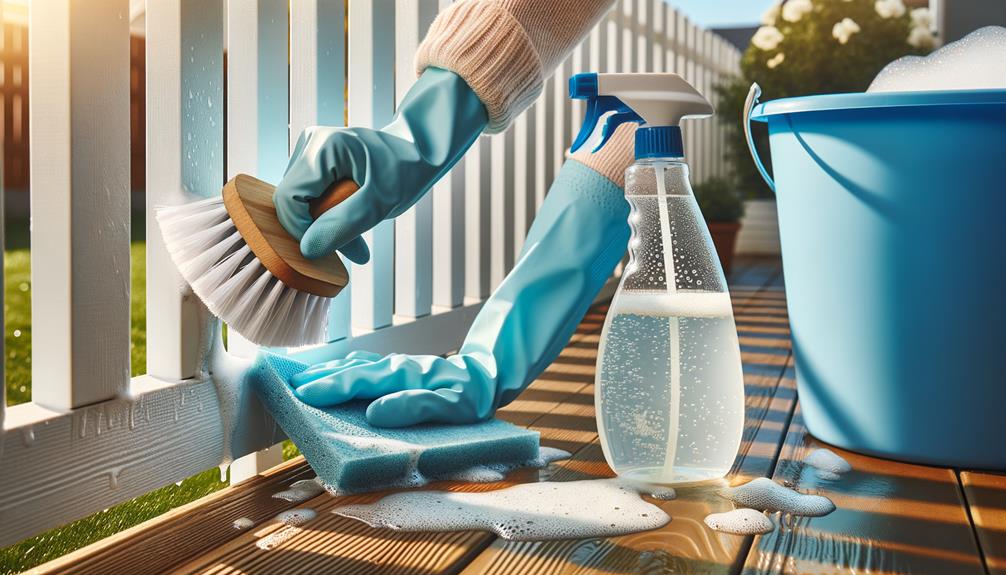Did you know that white vinyl fences are becoming increasingly popular among homeowners, with over 40% of new fences being made of vinyl? If you're one of the proud owners of a white vinyl fence, you know how beautiful it can look when it's clean and well-maintained. But what if you don't have a pressure washer? Don't worry, we've got you covered. In this guide, we'll walk you through the steps to effectively clean your white vinyl fence without the need for a pressure washer. So, if you're ready to restore the pristine appearance of your fence, keep on reading.
Gather Necessary Cleaning Supplies
To ensure a thorough and efficient cleaning process, gather all the necessary supplies for cleaning your white vinyl fence. While pressure washing may be a popular method for cleaning fences, there are alternative options that can effectively remove dirt and grime. In this subtopic, we will discuss these pressure washing alternatives and homemade cleaning solutions that you can use to restore the pristine appearance of your white vinyl fence.
Before you begin cleaning, it is important to gather the right tools and materials. First, you will need a bucket filled with warm water. This will serve as the base for your homemade cleaning solution. Next, add a few drops of dish soap or a mild detergent to the water. These will help break down any dirt or stains on the fence. You can also add a cup of white vinegar to the solution for added cleaning power.
To apply the cleaning solution, you will need a long-handled scrub brush or a soft-bristle brush. These will help you reach all the nooks and crannies of your fence. Additionally, have a hose or a bucket of clean water nearby to rinse off the solution after scrubbing.
For tough stains or stubborn grime, you may need to use a pressure washer. However, if you don't have access to one, don't worry. The homemade cleaning solution and a little elbow grease can still achieve great results.
Pre-Treat Stains and Discoloration
If you notice any stains or discoloration on your white vinyl fence, there are effective pre-treatment methods you can use to enhance the cleaning process. Before diving into cleaning, it's important to address any stubborn stains or discoloration. Here are some tips to pre-treat stains and discoloration on your white vinyl fence:
- Using bleach for stubborn stains: Bleach is a powerful cleaning agent that can help remove tough stains from your white vinyl fence. Mix equal parts of bleach and water in a bucket and apply it to the stained areas using a sponge or brush. Allow the bleach solution to sit for a few minutes before rinsing it off with water. Be sure to wear gloves and protect nearby plants or grass from the bleach.
- Alternative cleaning methods: If you prefer not to use bleach, there are alternative cleaning methods you can try. One option is to mix vinegar and water in a spray bottle and spray it onto the stained areas. Let it sit for a few minutes before scrubbing with a soft brush or cloth. Another alternative is to create a paste using baking soda and water, apply it to the stains, and scrub gently. Rinse off the paste with water when finished.
- Spot cleaning: For smaller stains or discoloration, spot cleaning can be effective. Use a soft cloth or sponge soaked in a mild detergent solution to gently scrub the affected areas. Rinse with water and repeat if necessary.
- Avoid abrasive cleaners: While it may be tempting to use abrasive cleaners, they can damage the surface of your white vinyl fence. Avoid using harsh chemicals or scrub brushes with stiff bristles, as they can cause scratches or discoloration.
- Test a small area first: Before applying any cleaning solution or method to your entire fence, test it on a small, inconspicuous area first. This will help ensure that the cleaning process doesn't cause any unintended damage or discoloration.
Scrub the Fence With a Cleaning Solution
Now it's time to scrub your white vinyl fence with a cleaning solution to remove dirt, grime, and any remaining stains or discoloration. Effective scrubbing techniques are essential to ensure a thorough cleaning. Here are some DIY cleaning solutions you can use for your white vinyl fence.
- Baking Soda and Water: Create a paste by mixing baking soda with water. Apply the paste to the fence using a brush or sponge and scrub gently. Rinse with water afterward.
- Vinegar and Water: Mix equal parts of vinegar and water in a spray bottle. Spray the solution onto the fence and let it sit for a few minutes. Scrub the fence using a soft brush or sponge. Rinse with water to remove any residue.
- Dish Soap and Water: Mix a small amount of dish soap with water in a bucket. Dip a brush or sponge into the soapy water and scrub the fence in circular motions. Rinse thoroughly with water.
- Oxygen Bleach: Mix oxygen bleach with warm water according to the manufacturer's instructions. Apply the solution to the fence using a brush or sponge and scrub gently. Let it sit for a few minutes before rinsing with water.
Remember to wear protective gloves and eyewear when using cleaning solutions. Test the solution on a small, inconspicuous area of the fence first to ensure it doesn't cause any damage or discoloration.
Rinse off the Cleaning Solution
After thoroughly scrubbing your white vinyl fence with a cleaning solution, the next step is to rinse off the solution to ensure a clean and residue-free finish. Here are some tips for drying the fence after rinsing off the cleaning solution, as well as how to maintain the cleanliness of a white vinyl fence without pressure washing:
- Use a hose with a high-pressure nozzle attachment to rinse off the cleaning solution. Start at the top and work your way down, making sure to thoroughly rinse all areas of the fence.
- For stubborn residue or stains, you can use a soft-bristled brush to gently scrub the area while rinsing. Be careful not to apply too much pressure, as this could damage the vinyl.
- After rinsing, use a clean cloth or sponge to dry any excess water from the fence. This will help prevent water spots and streaks from forming.
- If you notice any remaining residue or stains after drying, you can repeat the cleaning process or use a vinyl fence cleaner specifically designed to remove tough stains.
- To maintain the cleanliness of your white vinyl fence without pressure washing, regularly clean it with a mild detergent and water solution. Avoid using harsh chemicals or abrasive cleaners, as these can damage the vinyl.
Apply a Protectant to Prevent Future Stains
To prevent future stains, it is recommended to apply a protectant to your white vinyl fence. A protectant acts as a barrier between the fence and environmental elements, helping to maintain its pristine appearance and extend its lifespan. There are several benefits to using a protectant on your white vinyl fence.
First, a protectant provides UV protection. The sun's rays can cause the vinyl to fade and discolor over time. By applying a protectant with UV inhibitors, you can shield your fence from the damaging effects of the sun and keep it looking vibrant and white.
Second, a protectant repels dirt and stains. It creates a barrier that prevents dirt, grime, and other contaminants from adhering to the surface of the fence. This means that you won't have to clean your fence as frequently, saving you time and effort in the long run.
Third, a protectant helps to prevent mold and mildew growth. These unsightly organisms thrive in moist environments and can quickly take hold on a vinyl fence. By applying a protectant that contains mold and mildew inhibitors, you can inhibit their growth and keep your fence looking clean and fresh.
To make an informed decision about which protectant to use, consider the following table that compares different protectant options and their benefits:
| Protectant Type | Benefits |
|---|---|
| Wax-based | Provides a glossy finish and enhances the fence's appearance. Offers excellent UV protection. |
| Silicone-based | Creates a long-lasting barrier against dirt, stains, and moisture. Resistant to cracking and fading. |
| Polymer-based | Forms a durable protective layer that resists fading, cracking, and discoloration. Offers superior UV protection. |



